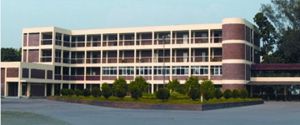Bangabandhu Sheikh Mujibur Rahman Agricultural University
Bangabandhu Sheikh Mujibur Rahman Agricultural University the second agricultural university of Bangladesh, located at Salna in the district of Gazipur. As per the law enacted by the National Assembly, through an Ordinance (Presidential Order No. 16 of 1998), the President of the country established the university in November, 1998 redesignating the former Institute of Postgraduate Studies in Agriculture (IPSA). The university started functioning from 1998 with a view to providing higher education, research facilities, technology innovation and transfer in different branches of agricultural science. The university has been named in memory of Bangabandhu Sheikh Mujibur Rahman.

In 1980 the government established Bangladesh College of Agricultural Sciences (BCAS) to extend higher education in agriculture. Through the active cooperation of the government of Japan, within a short time the college made remarkable strides in developing both physical and academic infrastructures for teaching and research. Subsequently, to meet the demand for more skilled and educated manpower for different sectors of agriculture, the government transformed the college in 1983 into IPSA, a postgraduate academic institution offering MS and PhD degrees in different branches of agricultural science. IPSA began to follow the courses and curricula of the bangladesh agricultural university from 1984. From 1985, Japan International Cooperation Agency (JICA), and from 1986, United States Agency for International Development (USAID) started giving technical cooperation to make the institute an ideal seat of higher learning.
From the very beginning, BCAS and IPSA were under the administrative control of the bangladesh agricultural research institute (BARI). But in 1988 IPSA was separated from BARI and became an autonomous institute under the Ministry of Agriculture. The Ministry formed a management committee to look after the affairs of IPSA. Through an Ordinance, the government gave full autonomy to the institute effective from March 1994. The Rector was made the chief executive of IPSA.
The major objectives of Bangabandhu Sheikh Mujibur Rahman Agricultural University (BSMRAU) are: to offer higher degrees in agricultural sciences;' to generate useful data and information through applied agricultural research; to develop improved varieties of crop, appropriate technology, efficient agricultural management system etc; to cooperate with other centres of higher education and research; and (e) to actively participate in agricultural extension, transfer of appropriate technology, and dissemination of knowledge.
Academic Departments' The university now has 10 degree awarding departments, namely Agronomy, Crop Botany, Entomology, Genetics and Plant Breeding, Horticulture, Plant Pathology, Soil Science, Agricultural Economics, agroforestry and Environment, and Agricultural Extension and Rural Development. In addition, the associate department of Statistics assists teachers and researchers in the analysis of research data.
Academic programmes' In this university each academic year has been divided into three terms - Autumn, Winter, and Summer. The duration of each term is 12 weeks.
At present, the university has 49 full time teachers. There are also about 50 adjunct faculty members now associated with teaching and research in various departments. These scholars are mostly from other universities, such as, the Bangladesh Agricultural University, Dhaka University, Bangladesh Agricultural Research Institute, Bangladesh Rice Research Institute, Bangladesh Agricultural Research Council, and Soil Resources Development Institute. Currently about 30 officers and 144 other staff work at the university.
Research activities' At the postgraduate level, each student has to conduct research for his/her thesis. At present, almost all departments have short and/or long-term research projects. Students as well as teachers are actively associated with these projects.
Physical facilities and infrastructures' The university campus occupies an area of about 76 ha of land. For teaching, research and associated activities it has faculty buildings, classrooms with audio-visual facilities, research laboratories, field laboratories, library, a health centre, dormitories for students, etc. Included among other physical establishments are administrative buildings, residential houses for teachers and staff, a mosque, a bank, a post-office, etc.
For field research, the university has a 16 ha farm land with a modern field laboratory. The farm has its own tractors, power tillers, irrigation facilities, and other necessary equipment. Moreover, there are harvesters, threshers, dryers, and other field appliances for proper operation and management of experimental plots and farmlands.
The electron microscope laboratory with its associated infrastructures is quite modern. The laboratory has facilities for transmission and scanning micro photography, and is equipped with photo-processing devices in an attached photographic room.
There is a fully equipped specialised centre within the university campus for measuring different weather-related parameters, such as air temperature, humidity, soil moisture and temperature, rainfall, day length, light intensity, air pressure and velocity, etc. A computer centre for data analysis, word processing, and graphics serve students and researchers in all matters related to computing research results. The centre also arranges computer-training programmes for students.
Other activities' Seminars, symposia, and workshops are regularly arranged for dissemination of research findings and innovations of researchers of this university to other agricultural scientists and agricultural extension workers. In addition, regular research-based programmes are conducted for identification and addressing the problems of the farmers at the village level. From 1991, the university has been regularly publishing a biannual journal titled Annals of Bangladesh Agriculture.
Library' The university library has now about 12,000 books and 227 titles of journals. There are also CD-ROM and internet facilities for use of students and teachers.
Administration 'The Vice-Chancellor is the executive head of the university. The Academic Council and the Syndicate assist the Vice-Chancellor in matters related to university administration. [SM Humayun Kabir]
See also bangladesh agricultural university.
